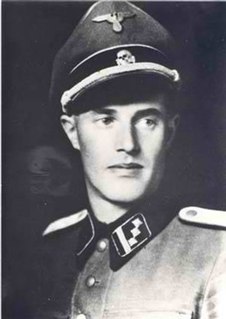
Franz Joseph I or Francis Joseph I was Emperor of Austria, King of Hungary, and monarch of many other states of the Austro-Hungarian Empire, from 2 December 1848 to his death. From 1 May 1850 to 24 August 1866 he was also President of the German Confederation. He was the longest-reigning Emperor of Austria and King of Hungary, as well as the third-longest-reigning monarch of any country in European history, after Louis XIV of France and Johann II of Liechtenstein.

Rudolf, Crown Prince of Austria was the only son of Emperor Franz Joseph I and Elisabeth of Bavaria. He was heir apparent to the throne of Austria-Hungary from birth. In 1889, he died in a suicide pact with his mistress, Baroness Mary Vetsera, at the Mayerling hunting lodge. The ensuing scandal made international headlines. He was named after the first Habsburg King of Germany, Rudolf I, who assumed the throne in 1273.

Alois Mock was a politician and member of the Austrian People's Party (ÖVP). He was Vice Chancellor of Austria from 1987 to 1989. As foreign minister, he helped take Austria into the European Union.

Laxenburg is a market town in the district of Mödling, in the Austrian state of Lower Austria. Located about 20 km (12 mi) south of the Austrian capital Vienna, it is chiefly known for the Laxenburg castles, which, beside Schönbrunn, served as the most important summer retreat of the Habsburg monarchs.

Rudolf Kirchschläger, GColIH was an Austrian diplomat, politician and judge. From 1974 to 1986 he served as President of Austria.

Baron Cajetan von Felder was an Austrian lawyer, entomologist and liberal politician. He served as mayor of Vienna from 1868 to 1878.

The House of Liechtenstein, from which the principality takes its name, is the family which reigns by constitutional, hereditary right over the nation of Liechtenstein. Only dynastic members of the family are eligible to inherit the throne. The dynasty's membership, rights and responsibilities are defined by a law of the family, which is enforced by the reigning Prince and may be altered by vote among the family's dynasts, but which may not be altered by the Government or Parliament of Liechtenstein.

Austria competed at the 1936 Summer Olympics in Berlin, Germany. 234 competitors, 217 men and 17 women, took part in 105 events in 19 sports.

Weitra is a small town in the district of Gmünd in the Austrian state of Lower Austria.

Alfons Gorbach was an Austrian politician of the conservative People's Party (ÖVP). He served as Chancellor of Austria from 1961 to 1964.
The Mozart Medal or Mozartinterpretationspreis was a music award named after Wolfgang Amadeus Mozart, administered by the Mozartgemeinde Wien and sponsored by the Austrian Ministry of Education and Culture. It was awarded from 1963 to 1999.

The Decoration of Honour for Services to the Republic of Austria is a national honour awarded by the Republic of Austria.

Presidential elections were held in Austria on 18 May 1980. Supported by both major parties, the ruling Socialist Party and opposition Austrian People's Party, incumbent president Rudolf Kirchschläger was re-elected with a landslide of 79.9% of the vote. The competing candidates were Willfried Gredler of the Freedom Party of Austria and Norbert Burger of the National Democratic Party, which was later banned.

Presidential elections were held in Austria on 23 May 1965, following the death of incumbent President Adolf Schärf on 28 February. The result was a victory for Franz Jonas of the Socialist Party, who received 50.7% of the vote. Voter turnout was 96.0%.

Presidential elections were held in Austria on 25 April 1971. The result was a victory for incumbent President Franz Jonas of the Socialist Party, who received 52.8% of the vote. Voter turnout was 95.3%.
Helmut Erich Deutsch is an Austrian classical pianist, specialising in chamber music and lieder accompaniment.

Franz Novak was an Austrian SS-Hauptsturmführer. Novak was Adolf Eichmann's railroad and transportation timetable expert; he coordinated the railroad deportation of European Jews to concentration and extermination camps.
The following events occurred in June 1974:














